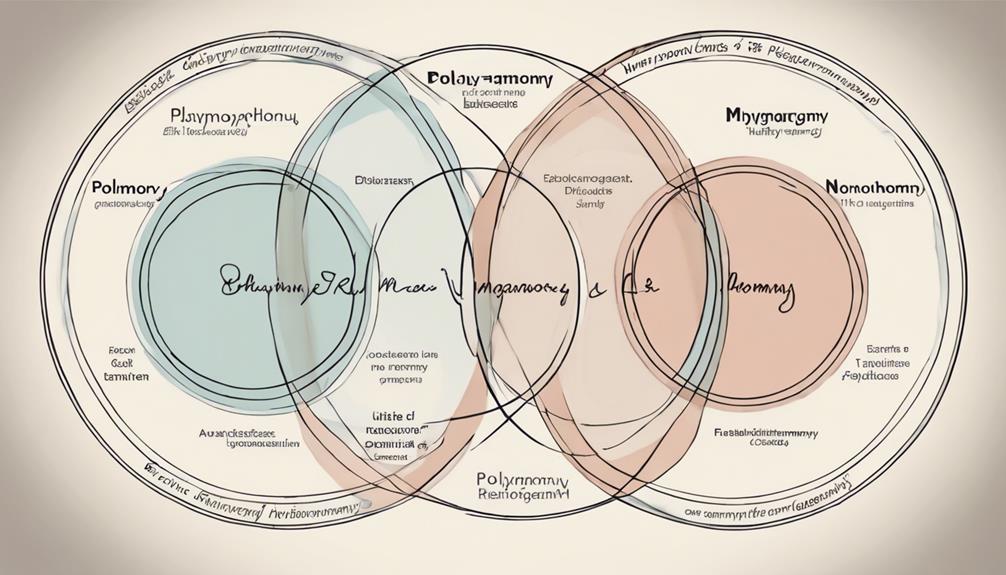Some people may not be aware of the difference between polyamory and ethical non-monogamy. Although these terms are frequently used interchangeably, they represent various facets of non-traditional relationships.
Understanding the nuances between the two can shed light on the diverse ways people approach multiple partnerships and connections. By exploring the definitions, principles, boundaries, and communication styles within polyamory and ethical non-monogamy, we can gain a deeper insight into the complexities of modern relationship dynamics.
Key Takeaways
- Polyamory involves multiple romantic relationships with a focus on emotional connections.
- Ethical non-monogamy encompasses various consensual non-monogamous relationship styles beyond polyamory.
- Polyamory emphasizes emotional involvement, while ethical non-monogamy includes diverse dynamics.
- Both prioritize open communication, honesty, respect, and consent among partners.
Definition of Polyamory and Ethical Non-Monogamy
In understanding the differences between polyamory and ethical non-monogamy, it's essential to grasp the distinct definitions of each relationship approach. Polyamory involves forming multiple romantic relationships with the consent of all partners, emphasizing emotional connections and love.
On the other hand, ethical non-monogamy is a broader concept that includes various consensual non-monogamous relationship styles, such as open relationships and polyfidelity, beyond just polyamory.
Both polyamory and ethical non-monogamy underscore the importance of communication, consent, and respect among all partners involved. These relationships require openness and honesty to navigate the complexities of having multiple partners. Understanding the nuances between these relationship styles can help individuals establish their preferences and boundaries effectively.
Key Principles of Polyamory

Let's explore the foundational principles of polyamory, which center around fostering honest, respectful, and loving connections with multiple partners.
In polyamorous relationships, ethical considerations are paramount, emphasizing the importance of open communication, honesty, and respect among all individuals involved. This approach values the romantic and emotional aspects of connecting with multiple people, prioritizing deep emotional bonds over mere physical interactions.
Participants in polyamory actively engage in personal growth, striving for mutual understanding through ongoing dialogue and introspection. Consent and boundaries play a crucial role in navigating the complexities of polyamorous relationships, encouraging continuous learning and adaptation to ensure that all parties feel valued and respected.
Boundaries in Ethical Non-Monogamy
Establishing and respecting clear boundaries is essential in ethical non-monogamous relationships to ensure that all partners' needs and expectations are honored and upheld.
Key Points:
- Boundaries in ethical non-monogamy help define acceptable and unacceptable behavior within the relationship dynamic.
- Negotiating and revisiting boundaries regularly promotes open communication and mutual understanding among partners.
- Boundaries can include guidelines on emotional involvement, sexual activities, time management, communication with other partners, and privacy.
In ethical non-monogamous relationships, setting boundaries isn't about restricting freedom but creating a safe space for everyone involved. It's crucial to communicate openly about what feels comfortable and where lines should be drawn. By discussing and mutually agreeing on boundaries, trust and transparency are fostered, contributing to the overall health of the relationship.
Communication in Polyamory

Navigating polyamorous relationships requires open and honest communication about feelings, boundaries, and relationship expectations to foster trust and emotional connection among partners. In polyamory, communication serves as the cornerstone for building strong and healthy connections. By prioritizing clear and transparent dialogue, partners can address complex emotions, navigate feelings of jealousy, and manage the intricacies of scheduling among multiple individuals.
Effective communication in polyamory involves regular check-ins and discussions to ensure that everyone's needs and desires are understood and respected. These conversations not only establish boundaries but also create a safe space for expressing vulnerabilities and insecurities. By openly sharing emotions and concerns, partners can work together to reinforce trust and strengthen their bond.
Transparent communication fosters a sense of security within the relationship dynamic, allowing each individual to feel heard and valued. It paves the way for a deeper understanding of partner's perspectives, enhancing the overall intimacy and connection in polyamorous relationships.
Comparing Relationship Structures
Comparing different relationship structures can provide valuable insights into the diverse dynamics and approaches within polyamory and ethical non-monogamy. When exploring these loving relationships, it's essential to understand the nuances that differentiate them:
- Polyamory: Focuses on loving multiple people romantically, emphasizing emotional involvement and romantic connections with various individuals.
- Ethical Non-Monogamy: Encompasses different types of consensual non-monogamous relationships like open relationships, polyfidelity, and other dynamics beyond romantic love.
- Communication and Honesty: Both polyamory and ethical non-monogamy stress the importance of honest communication and respect among all partners, albeit with different emphases on romantic involvement.
Frequently Asked Questions
Is Ethical Non-Monogamy the Same as Polyamory?
Yes, ethical non-monogamy differs from polyamory.
While polyamory involves loving multiple people romantically, ethical non-monogamy encompasses a wider range of relationship structures.
It's vital to understand these distinctions to navigate the diverse world of non-monogamous relationships effectively.
Why Is Polyamory Ok but Not Polygamy?
Polyamory is generally more accepted than polygamy due to its emphasis on consensual, loving relationships. While polygamy often raises concerns about power dynamics and gender equality, polyamory focuses on autonomy and equality among partners.
One interesting statistic is that in a recent survey, 68% of respondents viewed polyamory positively, recognizing its focus on love and emotional attachment. This contrasts with the historical associations and legal restrictions often linked to polygamy.
What Is ENM Vs Poly Vs Open Relationship?
In ENM, we embrace various consensual non-monogamous relationships with open communication and honesty.
Polyamory, a subset of ENM, involves loving multiple people romantically, emphasizing emotional connections and intimacy.
Open relationships, another form of ENM, prioritize sexual freedom and exploration, allowing partners to engage in sexual encounters outside the primary relationship.
It's crucial to communicate clearly, negotiate, and establish boundaries to define and navigate ENM, polyamory, and open relationships effectively.
What Is the Difference Between CNM and ENM Relationship?
In our relationship journeys, we've found that the key difference between CNM and ENM lies in the ethical foundation.
While CNM encompasses various non-monogamous structures, ENM specifically prioritizes honesty, respect, and open communication.
This distinction ensures that ENM relationships are rooted in ethical practices and mutual consent.
Can Polyamory and Ethical Non-Monogamy Be Used Interchangeably?
While ethical nonmonogamy and polyamory are often used interchangeably, there are some key differences. Ethical nonmonogamy is a broad term that encompasses various consensual non-monogamous relationships, while polyamory specifically refers to having multiple romantic relationships with the full consent and knowledge of everyone involved.
Conclusion
In conclusion, navigating the complexities of polyamory and ethical non-monogamy requires a deep understanding of oneself and open communication with partners.
By embracing the key principles of consent, communication, and respect, we can create fulfilling and sustainable relationships.
Remember, just like a garden, love requires constant nurturing and attention to flourish.
So let's continue tending to our relationships with care and intention, cultivating a love that blooms beautifully in all its forms.









